|
|
|
Sort Order |
|
|
|
Items / Page
|
|
|
|
|
|
|
| Srl | Item |
| 1 |
ID:
188648
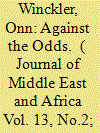

|
|
|
|
|
| Summary/Abstract |
Following independence, but particularly following the 1948–1949 Arab-Israeli War and more so in the wake of the assassination of King Abdullah I, a common prediction among both intelligence units and academics was that Jordan, at least in its initial form, namely as a sovereign political entity under the rule of the Hashemite family, would have a limited lifespan. These pessimistic projections were largely intensified following the June 1967 War and the Black September events. In retrospect, despite the high volatility of the Jordanian economy since the mid-1980s, and more so following the Iraqi invasion of Kuwait, Jordan is currently not only more politically stable than most of the other non-oil Arab countries, but also its socioeconomic situation is better. The aim of this article is twofold: first, to examine the major socioeconomic challenges that the Kingdom had to deal with that led so many to evaluate that it would not survive; and second, to explore the core socioeconomic pillars that enabled Jordan to survive. The core question that remains is, in light of the current major challenges – namely, the continuation of the Coronavirus pandemic; the continuing presence of large number of Arab Spring refugees; the ongoing instability in Syria and Iraq; the Kingdom’s high unemployment rate; and above all, the persistence of the rapid population growth – will the current rentier system work well “enough to survive” or, if not, what will the political consequences of failure be?
|
|
|
|
|
|
|
|
|
|
|
|
|
|
|
|
| 2 |
ID:
130309
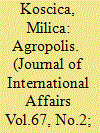

|
|
|
|
|
| Publication |
2014.
|
| Summary/Abstract |
Over fifty percent of the world's population is urbanized-living in cities- and cities almost entirely depend on imported food to meet daily needs. Different factors such as population growth, urbanization and increasing global demand for food are intensifying; urban agriculture is an important tool for enhancing food security in response to the food related restraints faced by city dwellers. Through a historical retrospective of urban agriculture to an analysis of current practices and policies, these article explores urban agriculture's potential ability to manage the lack of land and water in cities through the development of innovate growing techniques that optimize the access, quality, and quality of foods for millions of people in developing cities around the globe.
|
|
|
|
|
|
|
|
|
|
|
|
|
|
|
|
| 3 |
ID:
189462
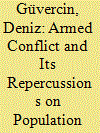

|
|
|
|
|
| Summary/Abstract |
The study empirically examines the impact of armed conflict on population growth in Eastern Turkey. The empirical findings confirm the implications of the theoretical model in the body of the paper. The results indicate that PKK recruitment leads to depopulation at the district level while increases rural population growth. Moreover, the results indicate that the number of killed PKK militants in the province to which a district belongs negatively affects population growth at the district level. On the other hand, the results also indicate that number of killed PKK militants does not significantly affect the population growth at the district level while decreases rural population growth. The results show that the percentage of valid votes to registered voters increases the population growth at the district level.
|
|
|
|
|
|
|
|
|
|
|
|
|
|
|
|
| 4 |
ID:
125281


|
|
|
|
|
| Publication |
2013.
|
| Summary/Abstract |
Disasters are not only increasing in number, they are becoming more complex as natural and man-made crises combine to cause mega-disasters. Rapid urbanization, population growth, political unrest, and migration have created fragile environments in many countries, and boundaries are blurring between complex emergencies and chronic vulnerability in places such as the Democratic Republic of the Congo and Somalia. These factors have resulted in intense pressure on the UN's humanitarian organizations and partners to respond more quickly when disaster strikes and to be more effective in its response.
|
|
|
|
|
|
|
|
|
|
|
|
|
|
|
|
| 5 |
ID:
125931


|
|
|
|
|
| Publication |
2013.
|
| Summary/Abstract |
With jobs disappearing across the developed world and arriving too slowly to keep pace with the population growth and aspirations of the developing world, the very nature of work is being challenged as never before. We asked our panel of global experts what they see as the most effective and expeditious way of creating jobs.
|
|
|
|
|
|
|
|
|
|
|
|
|
|
|
|
| 6 |
ID:
172086
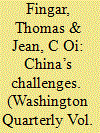

|
|
|
| 7 |
ID:
118272


|
|
|
|
|
| Publication |
2013.
|
| Summary/Abstract |
The dual forces of population growth and climate change will exacerbate pressures on land use, water access, and food security.
|
|
|
|
|
|
|
|
|
|
|
|
|
|
|
|
| 8 |
ID:
133700


|
|
|
|
|
| Publication |
2014.
|
| Summary/Abstract |
Sandy beaches along the 220km long West Bengal coast on the Northwest coast of the Bay of Bengal have not received much attention in the recent past despite their continual degradation both from natural forces and man-made activities related to construction of hotels, destruction of sand dunes and dune vegetation, beach- sand mining, discharge of hotel wastes directly onto the beach, and unscientific beach protection measures (Bhattacharya et al., 2003, Bhattacharya etal. 2009). Unethical and rampant use of this coastal zone by hoteliers, often violating the Coastal Zone Regulations (CRZ), has been vandalizing certain beach stretches for over two decades now. (wvvw. Dishaearth.org./mandarmoni). Burgeoning population growth in the state is causing increasing use of beaches for pleasure, recreation, and leisure activities throughout the year. Together with this, as pointed out by Klein (1985), beaches support coastal economics, commercial development, tourism and shift of population to the coastal areas.
|
|
|
|
|
|
|
|
|
|
|
|
|
|
|
|
| 9 |
ID:
116746


|
|
|
|
|
| Publication |
2012.
|
| Summary/Abstract |
The objective of the study is to re-investigate the multivariate electricity consumption function for Pakistan, particularly, economic growth, foreign direct investment and population growth over a 36-year time period, i.e., between 1975 and 2010. The study employed the bounds-testing procedure for cointegration which examines the short-run and long-run estimates. Dynamic short-run causality test is applied to determine the causality direction between electricity consumption and its determinants, by using Wald-F statistics. The results reveal that determinants of electricity consumption function are cointegrated and influx of foreign direct investment, income and population growth is positively related to electricity consumption in Pakistan. However, the intensity of these determinants is different on electricity consumption. If there is 1% increase in income, foreign direct investment and population growth; electricity consumption increases by 0.973%; 0.056% and 1.605%, respectively. This infers that income, foreign direct investment and population growth induce an increase in electricity consumption in Pakistan. Dynamic short-run causality test indicates that there has been unidirectional causality which is running from population growth to electricity consumption in Pakistan.
|
|
|
|
|
|
|
|
|
|
|
|
|
|
|
|
| 10 |
ID:
132499
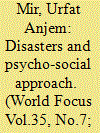

|
|
|
|
|
| Publication |
2014.
|
| Summary/Abstract |
Disasters both manmade as well as natural often result in great physical and material loss for the affected communities, besides affecting the social, physical and psychological well-being of the survivors in its aftermath. It has been seen that disasters have an adverse impact on the survival, dignity and livelihoods of individuals and communities, particularly of the poor, in both developed and less developed countries. There are multiple factors which have been attributed as causes of these extreme events, like environmentally unsound practices, global climatic changes, population growth, urbanization, social injustice, poverty etc. However, when it comes to comprehension of disasters in contemporary times, there is a need to look at disaster as social phenomena. This is precisely, with regard to man- nature relationship discourse. While explaining this relationship, Kroeber (1939 p1), rightly writes, ' while it is true that cultures are rooted in nature, and can therefore never be understood except with reference to that piece of nature in which they occur, they are no more produced by that nature thana plant" is produced or caused by the soil in which it is rooted. The immediate causes of cultural phenomena are other cultural phenomena.
|
|
|
|
|
|
|
|
|
|
|
|
|
|
|
|
| 11 |
ID:
100848


|
|
|
|
|
| Publication |
2009.
|
| Summary/Abstract |
The combined effects of an aging population, domestic migration, and the geographically heterogeneous effects of foreign immigration are producing politically significant changes in the distribution of the American population. Using statistical projections of state populations in the 2010 and 2020 US Censuses combined with statewide estimates of the normal vote based on the last five presidential elections (1992-2008), I show that by 2024 Republican presidential candidates will receive a net benefit of at least eight electoral votes due to the declining population of the Northeast and upper Midwest relative to the rapidly-growing Sun Belt. Democratic presidential candidates will find it increasingly difficult to win elections without having some success in the South and Southwest as Barack Obama did in 2008 but many previous candidates failed to do. While migration will also benefit some solid Democratic states such as California, on balance Republican presidential candidates are poised to benefit from the status of Sun Belt states as magnets for both foreign immigration and domestic migration from a retirement cohort of unprecedented size.
|
|
|
|
|
|
|
|
|
|
|
|
|
|
|
|
| 12 |
ID:
024516
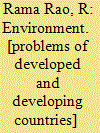

|
|
|
|
|
| Publication |
New Delhi, Economic and Scientific Research Foundations, 1976.
|
| Description |
52p.
|
|
|
|
|
|
|
|
|
|
|
|
Copies: C:1/I:0,R:0,Q:0
Circulation
| Accession# | Call# | Current Location | Status | Policy | Location |
| 023173 | 363.7/RAO 023173 | Main | On Shelf | General | |
|
|
|
|
| 13 |
ID:
040125
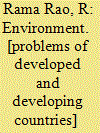

|
|
|
|
|
| Publication |
New Delhi, Economic and Scientific Research Foundation, 1976.
|
| Description |
52p.
|
|
|
|
|
|
|
|
|
|
|
|
Copies: C:1/I:0,R:0,Q:0
Circulation
| Accession# | Call# | Current Location | Status | Policy | Location |
| 016765 | 363.7/RAO 016765 | Main | On Shelf | General | |
|
|
|
|
| 14 |
ID:
109863
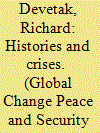

|
|
|
| 15 |
ID:
124258


|
|
|
|
|
| Publication |
2013.
|
| Summary/Abstract |
This paper deals with the gender aspects of urban livestock keeping in Eldoret, Kenya. It shows that men and women play different but complementary roles in livestock keeping. Men show greater preference for and are more involved - in terms of decision-making and responsibility taking - with large livestock and where income is the primary motive for livestock keeping, and perform tasks of an outdoor nature and/or which require considerable technical knowledge. On the other hand, women prefer and exercise greater control over small livestock, make the most decisions about consumption use of livestock products, and perform home-based routine tasks. However, there are instances where men and women cross gender boundaries, for instance where labour of the opposite gender is absent in the household, or as a strategy to control benefits accruing to the livestock. In terms of livelihood outcomes, women's role in livestock keeping is geared more towards improving household nutritional and food security status, while men's role is motivated more by personal benefits.
|
|
|
|
|
|
|
|
|
|
|
|
|
|
|
|
| 16 |
ID:
167623
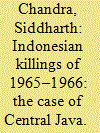

|
|
|
|
|
| Summary/Abstract |
The mass killings of 1965–1966 in Indonesia marked a watershed in its history. The consensus estimate of lives lost is 500,000. In this paper, demographic and geographic methods are used to characterize the violence in Central Java, one of the worst-affected provinces. The findings provide a portrait of the violence and its dynamics. This portrait highlights the likely complicity of a diverse array of political opponents of the Indonesian Communist Party (PKI). The findings also provide evidence supporting Clifford Geertz's three-aliran (cultural “stream”) model of Javanese society, with the complex interplay of the three aliran and the Indonesian Army in the political realm producing the violent outcomes of 1965–1966. In this manner, this study builds on prior work by Hefner, Jay, Lyon, Mortimer, and Ricklefs on the cultural and social underpinnings of the violence. It also builds on more recent work on the neighboring province of East Java in which the role of two of the three alirans was found to be a significant factor, underlining the importance of the intersection of culture, geography, and politics in understanding this violent episode in Indonesian history.
|
|
|
|
|
|
|
|
|
|
|
|
|
|
|
|
| 17 |
ID:
146699
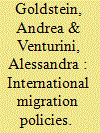

|
|
|
|
|
| Summary/Abstract |
International migration should be a core subject for global governance, given its transnational nature, and yet it is its “ugly duckling” and the global community has shied away from taking any concrete action to regulate cross-border flows of people, at least until 2015, when the refugee crisis in the Mediterranean prompted Turkey to include migration in the Antalya agenda. It is unlikely that the international community will move beyond the current consensus based on humanitarian principles and recognize that the free flow of people is a right, on the same level as trade and capital liberalization. At the same time, much of the criticism of migration policies is misplaced: efforts should be focused on improving the implementation of existing policies and fine-tune these policies in relation to entrance and integration, preferably in cooperation with the country of origin. The G20 should play a leading role in facilitating such coordination, also taking into account the increasing importance of South–South migration (such as the migration of Chinese citizens to Africa).
|
|
|
|
|
|
|
|
|
|
|
|
|
|
|
|
| 18 |
ID:
106706


|
|
|
| 19 |
ID:
118290
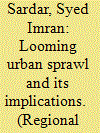

|
|
|
| 20 |
ID:
090184
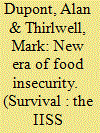

|
|
|
|
|
| Publication |
2009.
|
| Summary/Abstract |
With the world in the midst of the most serious economic downturn since the Great Depression and soft commodity prices depressed, it is easy to forget that barely a year ago sky-rocketing food prices were generating serious political and social strife in more than 30 countries around the world. The price of rice more than tripled in the 12 months to April 2008, while the food price index published by the Food and Agriculture Organisation (FAO) rose by an unprecedented 50%. In 2007, the number of people living in conditions of food insecurity increased by between 50 and 130 million as the global food import bill rose to its highest level on record. Pessimists predicted the end of cheap food presaging a new era of resource insecurity. The spectre of Malthus seemed once again to haunt the Earth. Were these dramatic increases in price merely a cyclical aberration or do they foreshadow a structural shift in supply and demand that will prove the pessimists right? These are not inconsequential questions. The price of food is a matter of profound importance for the economic well-being of billions of people and the political stability of the most affected states. This analysis explores the reasons for the 2008 food crisis by placing it in historical context and drawing out the implications for policymakers and business.
|
|
|
|
|
|
|
|
|
|
|
|
|
|
|
|
|
|
|
|
|